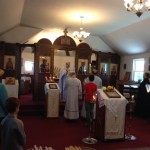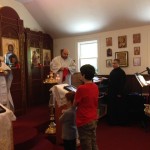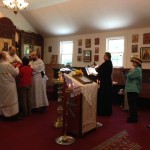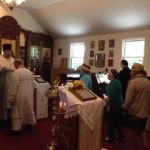On May 18, on the Sunday of the Samaritan Woman, Archpriest Igor Tarasov, Rector of St. George Parish celebrated the Divine Liturgy in our temple. Following the Scripture lessons he preached a homily:
“Today’s Sunday is dedicated to the Samaritan woman who had a very serious and profound conversation with our Lord Jesus Christ described in today’s Gospel lesson (Jn. 4, 5-42). Jews and Samaritans were two hostile communities. But when they were becoming the followers of Christ, they became united in faith and had to forget their past differences. In Jesus Christ all became the same, for in Christ “there is neither Greek nor Jew” (Col. 3, 11). All the true followers of Christ are now called Christians. This is their most important name.”
“Today’s Epistle lesson tells us that the name “Christian” was first given to the followers of Jesus in the city of Antioch (Acts 11, 26). Scholars say that Antioch was known for its ability to produce names. Those names were usually given in derision and contempt. Antiochians called one of the Roman emperors “the Goat”. Thus the name “Christian” was given to the followers of Jesus as a nickname. The people of Antioch had many names in their resourceful language, but they had no name to cover this type of character. These followers of Jesus did things, said things, lived things unheard of in the history of the world. They lived purity, forgiveness, love, humility of Jesus. So, the Antiochians made a new name for these people in whom they saw the behavior of Jesus Christ. They called them in Greek ‘Christianoi’ – Christ people. There was something so new about these people, something so refreshingly different, that they created a new name for them. “And the disciples were first called Christians in Antioch” (Acts 11, 26).”
“The Christians took this name given in mockery and turned it into one of the most revered names in history. The name tells us something very important the Christian: that there is resemblance between Christ and the Christian. The Christian is first and foremost a Christ person.
“If someone were to ask you, “Why are you a Christian?”, what would you reply? Many would reply that they are Christians because they were born in a Christian family, or because they were baptized. This is not good enough. Some would say that they are Christians because they believe in God and try to do good. But to be a Christian means far more than that. To see exactly what it means let us go back to the first Christians, the holy Apostles. How did they become Christians? One day Jesus said to them, “Follow Me!” And they left their past life and past cares and followed Him.”
“Here we have the answer. A Christian is someone who follows Christ consciously and by personal choice, who responds to his call, who says “yes” to Jesus. First and always it is a relationship to a Person, not a code or philosophy. To be a Christian is to be committed to God in Christ. It is to be living member of His Body, the Church.”
“A little boy once asked his father, “What is a Christian?” The father, who knew the Bible well, described to his son what being a Christian really is according to the New Testament. When he finished explaining, the little boy said, “Father, have I ever seen a Christian?””
“The pagans in Antioch did see Christians. In fact, they saw Christ in His followers – so much so that they called them by the very name of Christ. Does the world today see something of Christ in us? Does it see the purity, love or forgiveness of Christ in us? Is our lifestyle, our words and deeds, bear a witness of our faith in Christ? Can anyone point to you or me and say, “This is a Christian!”? Can anyone look at our parish and say, “These are Christians”?”
“Dear brothers and sisters! Our Lord said, “Let your light so shine before men that they may see your good works and glorify your Father in heaven” (Mt. 5, 16). Christians are people who shine before men. They shine by the light of Christ. It was because of such a light of Christ, because of such a Christ-like lifestyle that the early disciples of Jesus came to be called Christians. Let us ask ourselves whether anyone would be able to look at us and guess that we are Christians.”




